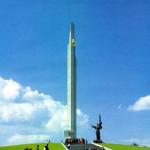Belarus Traditions
 Milk and dairy products are usually pasteurized and safe for consumption. Meat, poultry and fish are usually considered safe, but still recommended that they consume only after a preliminary heat treatment, preferably hot. Vegetables should be thoroughly washed and pre-processed and purified from fruit peel. Especially should be treated carefully so popular in the Belarusian table mushrooms.
Milk and dairy products are usually pasteurized and safe for consumption. Meat, poultry and fish are usually considered safe, but still recommended that they consume only after a preliminary heat treatment, preferably hot. Vegetables should be thoroughly washed and pre-processed and purified from fruit peel. Especially should be treated carefully so popular in the Belarusian table mushrooms.About 25% of the country is in a zone of radioactive contamination, so some products, especially dairy products, mushrooms and wild berries should be avoided. With regard to suspicious products operates a simple rule - that they buy or consume themselves locals, it is probably harmless, and for tourists.
Traditions and rituals of Belarus have much in common with those of its Slavic neighbor. Belarusian (Belarus) belong to the Middle-East European type of race, their ancestors were East Slavic tribes Dregovichy, Krivichy, Radimichi, partly drevlyans, northerners and Volynyane. The ancestors of the Belarusians have embraced many features of the ancient population of the province - Letto-Lithuanian tribes Yatvingians, as well as some features of the Polish, Lithuanian, Ukrainian, Russian and Jewish cultures, while preserving, despite the many devastating wars, not just rolled on the ground, its main national features. Itself the Belarusian ethnos is heterogeneous and includes several sub-ethnic groups - living in Polesie "Poleszuk, near Pinsk marshes -" Pinchuk ", along the upper reaches of the Dnieper is possible to observe verhnepridneprovsky anthropological type, and the southern Ukrainian noticeable effect. Even the language can be divided into two dialects - the south-west and north-east. Here also lived and inhabited by many representatives of the Jewish, Tatar, Ukrainian, Polish, Russian and other cultures, each of which has complete freedom of expression.
Culture of the country is perhaps the most well-preserved among the Eastern Slavs, a set of ancient pagan customs and traditions. Even though the centuries-long domination of Christianity, as the Orthodox and Catholic, in Belarus preserved remnants of many ancient rituals, starting with the Pancake and Kupala "Gromnitsy and Gukanne spring (break year from winter to summer)," Forty "and" Grandparents, "" Kolyada "and" Dazhynki "(the end of the harvest festival)," talaq "and" Syabryna "(the custom of communal mutual assistance), and ending with many rituals associated with marriage, birth or death. Like their neighbors, there were many rituals associated with agriculture, with logging and bath, and all nature was revered as a living creature. All these rituals intertwined in the later Christian rituals, forming a unique and colorful culture of Belarus. Extremely rich and diverse songs and oral folklore.
Basic local society has always been a family, usually small. Man held and holds an important place here - this is "But father" for children and dyadzka "for the younger members of the family, the main breadwinner and protector of the house. Women - equitable owner and hostess of housework, mother and keeper of the hearth. This reflected a dual part of the family and in everyday life - wooden and metal household items were considered "male", woven and braided - "female". And always and everywhere preference for subjects from natural materials. National clothing, shoes, musical instruments and even the type of dwellings close to the samples of other Slavic cultures, but the Belarusian identity is visible throughout, and to confuse the local clothing and jewelry, for example, with samples of Ukrainian or Lithuanian dress is impossible - such a distinctive local craftsmen.
Quiet and majestic nature of the country has left its mark on the face of the people. Belarusians for the most part very friendly and good-natured, the age-old communality has left its mark on the nature of relationships between people. Here are rarely seen noisy scenes in public, high mutual assistance between people and is dominated by respect for elders and the interlocutor. Even in business etiquette includes tradition of trust - there is rarely weight wrong on the markets, scrupulously observe the agreement and carefully cherish the reputation (and not only in business). A lot of cases, not only the community, addressed the council, even holidays usually carried out either with the whole family, or entire municipality.
In business circles are widely distributed Russian, English and German languages. In everyday life, in general use the Belarusian language, which re-introduced as a state in 1990, however, Russian is also widely distributed, which led to the formation of the international kind of slang known as "Trasianka. In any place you can hear the beginning of talks in the Belarusian, and continued - in Russian, or vice versa. As written basis the Cyrillic, but is sometimes used and the Latin alphabet. Some Belarusian pronunciation of place names in the local people sometimes sounds quite unusual, for example Hrodna (Grodno), Mahileu (Mogilev), Vitsebsk (Vitebsk), and so on, so when communicating such things should be borne in mind.
Official holidays and weekends:
January 1 - New Year.
January 7 - Orthodox Christmas.
March 8 - International Women's Day.
March 15 - Constitution Day.
March-May - Easter.
May 1 - Labor Day.
May 9 - Victory Day.
May 14 - Radunitsa.
July 3 - Independence Day.
November 2 - Catholic Memorial Day (Day of Remembrance of ancestors) "Forefathers".
7 November - Anniversary of the October Revolution.
December 25 - Catholic Christmas.